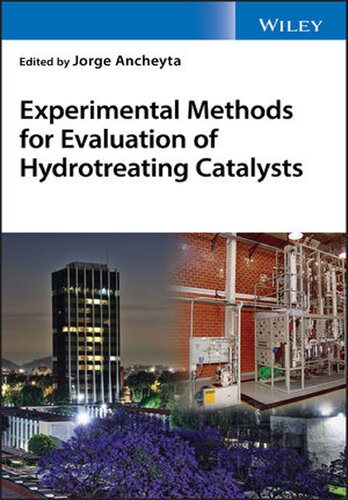

Most ebook files are in PDF format, so you can easily read them using various software such as Foxit Reader or directly on the Google Chrome browser.
Some ebook files are released by publishers in other formats such as .awz, .mobi, .epub, .fb2, etc. You may need to install specific software to read these formats on mobile/PC, such as Calibre.
Please read the tutorial at this link: https://ebookbell.com/faq
We offer FREE conversion to the popular formats you request; however, this may take some time. Therefore, right after payment, please email us, and we will try to provide the service as quickly as possible.
For some exceptional file formats or broken links (if any), please refrain from opening any disputes. Instead, email us first, and we will try to assist within a maximum of 6 hours.
EbookBell Team

0.0
0 reviewsPresents detailed information and study cases on experiments on hydrotreating catalysts for the petroleum industry
Catalytic hydrotreating (HDT) is a process used in the petroleum refining industry for upgrading hydrocarbon streams―removing impurities, eliminating metals, converting asphaltene molecules, and hydrocracking heavy fractions. The major applications of HDT in refinery operations include feed pretreatment for conversion processes, post-hydrotreating distillates, and upgrading heavy crude oils. Designing HDT processes and catalysts for successful commercial application requires experimental studies based on appropriate methodologies. Experimental Methods for Evaluation of Hydrotreating Catalysts provides detailed descriptions of experiments in different reaction scales for studying the hydrotreating of various petroleum distillates.
Emphasizing step-by-step methodologies in each level of experimentation, this comprehensive volume presents numerous examples of evaluation methods, operating conditions, reactor and catalyst types, and process configurations. In-depth chapters describe experimental setup and procedure, analytical methods, calculations, testing and characterization of catalyst and liquid products, and interpretation of experiment data and results. The text describes experimental procedure at different levels of experimentation―glass reactor, batch reactor, continuous stirred tank reactor, and multiple scales of tubular reactors―using model compounds, middle distillates and heavy oil. This authoritative volume:
Experimental Methods for Evaluation of Hydrotreating Catalysts is an indispensable reference for researchers and professionals working in the area of catalytic hydrotreating, as well as an ideal textbook for courses in fields such as chemical engineering, petrochemical engineering, and biotechnology.